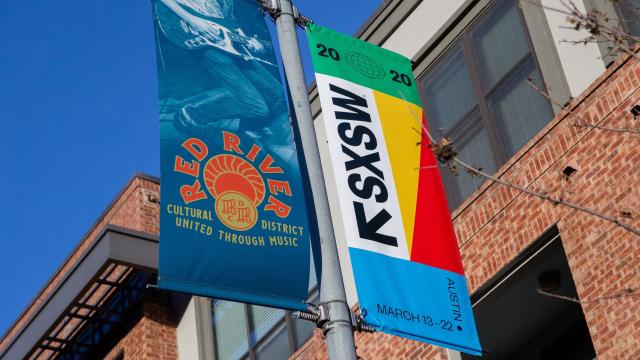The cancellation of this year’s annual South by Southwest Festival in Austin, Texas, due to the global coronavirus pandemic has hit its organising body hard, with dozens of employees let go on Monday.
The layoffs hit about one-third of the full-time staff working for the music, film, TV, art, and media festival, which said in a statement last week that SXSW team was “devastated” to receive a cancellation order from Austin health officials. The Wall Street Journal reported on Sunday evening that SXSW was not insured against disease-related cancellations and that organisers were worried about potential funding losses in the tens of millions of dollars. (On Monday, Austin-Travis County went one step further and issued a prohibition on all events with an attendance of 2,500 or more without prior approval by Austin Public Health, effective immediately and extending through May 1.)
In a statement to Gizmodo, a SXSW spokesperson wrote:
Due to the City of Austin’s unprecedented and unexpected cancellation of the SXSW 2020 events in March, SXSW has been rigorously reviewing our operations, and we are in the unimaginable position of reducing our workforce. Today we said goodbye to approximately one-third of our full-time staff.
Those of us in the business of live events know the level of trust required to execute an event of SXSW’s scale, and we are deeply sad to let people go this soon. We are planning for the future and this was a necessary, but heartbreaking step.
NEW: After talking to @wsj yesterday about their precarious financial situation in light of the coronavirus cancellation, #SXSW confirms they today let 1/3 of their full-time employees go (approximately 58 people).
Sad news for Austin’s prized festival. https://t.co/wfdcT38WxY pic.twitter.com/oPIfrVnpfU
— Elizabeth Findell (@efindell) March 9, 2020
According to CultureMap Austin, “most” of the layoffs are SXSW staff working on music.
SXSW pumped hundreds of millions into Austin’s economy (estimated by organisers at $US355 ($538) million last year) and its cancellation this year will likely cause considerable economic pain for locals. Dozens of other major events, including Google and Facebook conferences, have also been scrapped, with news that an attendee at the Conservative Political Action Conference in D.C. in late February had tested positive for the coronavirus highlighting the risks of large gatherings. Growing outbreaks in states across the country have begun to directly impact daily life in the form of school closures and signs a recession could be on the way.
According to the latest World Health Organisation coronavirus update, health authorities across the globe have documented almost 109,600 cases and over 3,800 deaths. The U.S. has logged at least 539 cases in 34 states with 22 deaths, with National Institute of Allergy and Infectious Diseases director Anthony Fauci saying that federal, state, and local authorities may eventually have to consider regional lockdowns of some kind in order to stagger community spread and prevent hospitals and other medical personnel from being overwhelmed. (In hard-hit Italy, where there are over 9,000 cases, lockdowns have now been imposed nationwide.)
[referenced url=” thumb=” title=” excerpt=”]
A large study from China recently concluded that around 81 per cent of studied cases of COVID-19, the disease caused by the virus, resulted in only minor symptoms and full recovery. However, 14 per cent resulted in severe symptoms and just under 5 per cent resulted in critical symptoms involving situations such as “respiratory failure, septic shock or multiple organ dysfunction,” according to the New York Times. The exact mortality rate is unknown. While some research has pegged it as around 3.4 per cent of cases, that number is based primarily on cases that were serious enough to have been recorded and varies widely by country, so the actual rate could be far lower. Health officials told Congress last week they estimate the death rate in the U.S. from COVID-19 will be between one in a hundred to one in a thousand cases and predominantly among older and immunocompromised people.
According to the Wall Street Journal, SXSW co-founder and chief executive Roland Swenson said the festival had contracts with hundreds of people or entities, ranging from performers and artists to vendors and venues. He told the paper, “We did not anticipate a pandemic. We’d always taken the attitude of, ‘Well, we’ll never cancel, so that’s not going to be an issue.’”
It’s still possible SXSW could be rescheduled to later this year, though the complicated finances of doing so might be a barrier, the WSJ reported. CultureMap noted that while some performers had pledged to still give shows at other Austin-area venues, the Monday order from local health authorities could prevent them from doing so.
“I am most worried about my people and what this means for their future, and I don’t know what that is yet,” Swenson told the WSJ. “We are planning to carry on and do another event in 2021, but how we’re going to do that I’m not entirely sure.”
